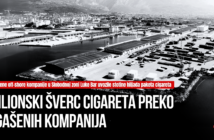Public Enterprise for Coastal Zone Management (JPMD) and the Government of Montenegro have accepted the assessment of the company Terna for the use of sea areas for the construction of an undersea cable that is significantly less favorable than the market value of rent, thus consciously renouncing enormous revenues that the state budget could have had on this basis.
Terna offered €2.7 million for a fifty-year rent of waters and land in the coastal zone, while in the report on the assessment of market rent for the construction of an undersea cable it is stated that it ranges from a minimum of €5.5 million to a maximum of €69 million, depending on the calculation model applied by individual countries.
The Assessment Report, which was made in November last year, was commissioned only by the Coastal Zone Management. The document lists several world models of calculation of the rent, of which the Spanish model yields by far the highest revenue, and which in addition to the compensation for land marine part, includes also a fee based on the value of the investment.
If the Spanish model were applied, the fee for the land of the coastal zone would be €17,500 annually, the marine part would be €330,000, while the investment-based yield (the investment is projected at €85 million) would be nearly €1.3 million. Therefore, the total annual income would be nearly €1.4 million, while for 50 years it would total €68.9 million.
The project of submarine interconnection between Italy and Montenegro in the coastal zone covers a total area of 55,000 square meters of the seabed, of which 43,000 square meters would be needed for laying the submarine cable and 12,000 square meters to install electrodes. In addition to the coastal part, the project includes an additional area of 1,463 square meters in the mainland.
The Reports were also presents two versions of the American experience that starts from the calculation of compensation per mile. According to the first one, JPMD would earn €5.9 million from leasing the waters for 50 years, and according to the second, it would earn €8.4 million. The calculation did not include compensation for the land, which would further increase the revenue.
However, the expert notes that the amount of the rent should not be a cause for terminating the undersea cable project, which was presented as a “capital project of national importance”, and suggests that the compensation be between €5.5 million and €6.4 million for a period of 50 years. However, at the same time, he suggests considering the compensation for a shorter period, 25 years namely.
The proposal is justified by the fact that fees for laying cables significantly increase. Such is an example of USA, where in the mid-nineties these prices increased by 50 percent, whereas since 2000 by as much as 800 percent.
The negotiations on the harmonization of the price of the rent of the coastal zone between Terna and JPMD have been ongoing since March 2013. In March 2014, the Board of Directors of JPMD adopted the Report on the assessment of the market rent, on which it informed the Ministry of Sustainable Development. Afterwards, Terna did its own analysis of the value of the rent, emphasizing the “national character” of the project.
In a new letter addressed to the Ministry of Sustainable Development, the JPMD director Rajko Barovic literally negated the report commissioned by his institution, which estimates that the budget should have a much higher income than the one offered by Terna.
The letter states that “JPMD did not have its opinion of the public interest of the entire project and its value quantification.” Still, it remains unclear what benefits citizens will have from the project and in what amount.
However, Barovic at least had the expert’s assessment, which said that the rent price should be between €5.5 and €6.4 million, even if it is a “capital project of national importance” and had to insist on respecting the findings. However, after such a response from Barovic, the Ministry gave its approval to the public enterprise to accept the terms and price proposed by Terna.
On suspicion of abuse of office to the detriment of the budget of Montenegro, MANS yesterday filed a criminal complaint to the Supreme State Prosecutor’s Office against JPMD acting director Rajko Barovic, as a responsible person, and the Minister of Sustainable Development and Tourism Branimir Gvozdenovic, as being responsible for the arrangement with the Italian company Terna.
Given that the agreement on the use of the coastal zone is for the period of 50 years, it must be submitted to the Parliament for approval. It will be interesting to see whether the representatives of the highest legislative body will confirm the government’s decision and unquestionably damage the state budget.
Terna did all it could to increase the profit
Terna has reduced payments for as much as 50 percent, which is how much it is applied in Italy for projects of public interest. Still, it has used the comparative practice from Albania, where a trifling one euro is paid for investments of over €10 million, and Greece, which does not charge for the lease of submarine cables that are part of the national transmission network.
Obviously, driven merely by profit interests and explaining the very low cost of leasing the coastal zone, Terna deliberately left out the indicators that would reduce the profit on the basis of lease at a lower price.
According to the documents that MANS Investigation Center acquired, the original estimate of Terna was even lower and stood at mere €1.3 million for the 50-year rent of the land.
This text is created with the support of the European Union within the project “Zero Tolerance to Corruption”. Network for Affirmation of Non-Governmental Sector – MANS is solely responsible for the contents of this article, and the views taken herein shall not in any case be considered as those of the European Union.



